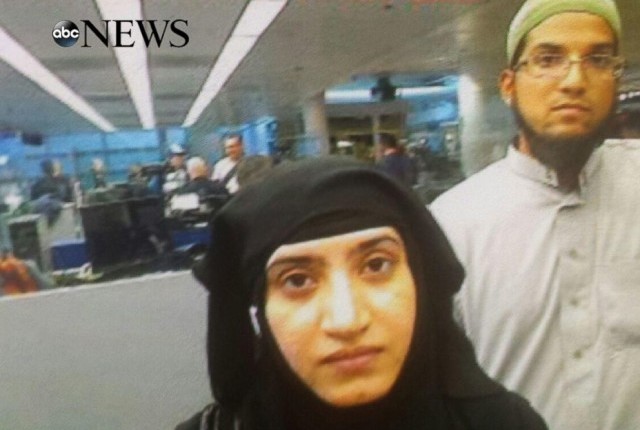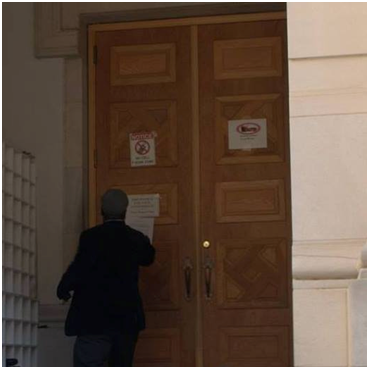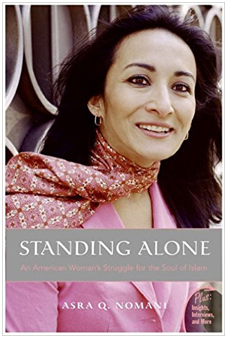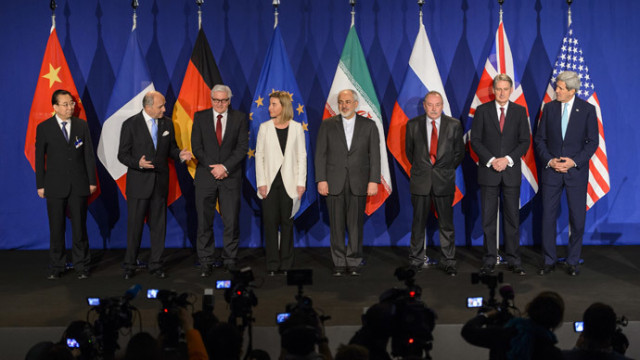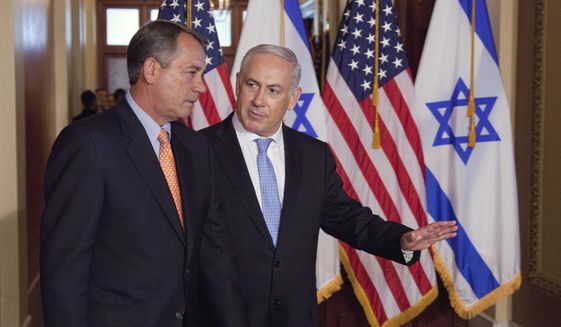VIDEO: Tafsheen Malik Radicalized at Women’s Islamic Academy
From U.S. and Canadian news reports comes evidence that the murderous Jihadi couple, Tafsheen Malik and Syed Rizwan Farooq had allegedly long been radicalized. The picture above from ABC News is a shot taken on July 27, 2014 when the couple went through customs at O’Hare International Airport after Ms. Malik had secured a K-1 fiancée Visa to come to the U.S. with her intended husband Farooq.
The Customs photo caught them in Sharia compliant garb reflective of professing fundamentalist Muslims. They were returning from an extensive trip that took Farooq to Saudi Arabia to meet Malik and hence to her parent’s home in Multan in Central Pakistan before returning together to California. There is the suspicion that Ms. Malik had undergone formal radicalization in her native Pakistan. Information on Malik’s background is emerging from independent investigations about her attendance at an Al Huda women’s Islamic Academy in Multan, one of several across Pakistan propounding a Salafist Islamic doctrine.
 The Los Angeles Times produced a report on the Pakistani Al Huda Islamist women’s seminaries and Ms. Malik’s attendance at the one in Multan, “San Bernardino assailant attended Islamic institute in Pakistan:”
The Los Angeles Times produced a report on the Pakistani Al Huda Islamist women’s seminaries and Ms. Malik’s attendance at the one in Multan, “San Bernardino assailant attended Islamic institute in Pakistan:”
Tashfeen Malik studied at Al Huda, a chain of religious institutes that teach a fundamentalist strain of Islam, while she was enrolled in a university in Pakistan’s Punjab region several years ago, according to two fellow students.
The two former classmates of Malik’s at Bahauddin Zakariya University in the city of Multan said she regularly attended Al Huda classes, whose stated objective is to bring women “back to their religious roots.”
“She used to go to attend sessions in Al Huda almost every day,” said one of the former classmates, who spoke on condition she not be identified. “She was not too close to any class fellow.”
The former classmate said that Malik, who studied pharmacology at the university, did not share her thoughts on religious issues.
Pakistani security expert points out the ‘fundamentalist’ Islamic doctrine propounded by Al Huda:
Dr. Ayesha Siddiqa, a Pakistani security analyst, said Al Huda teaches women “fundamentalist” ideas, though it does not necessarily promote a jihadist agenda.
“I call Al Huda the fourth generation of religious seminaries. It does not promote use of violence but takes you closer to the red line,” she said. “Now, it is a personal decision to cross the red line and take or give one’s life.”
Siddiqa said that the impact of the institutes is widespread, because a child who attends can influence other members of her family. “People would be familiar with, for instance, a daughter going to an Al Huda changing the mother and eventually the entire household. This dynamic is mirrored in more traditional seminaries as well.”
Malik, 29, was born in Pakistan to a land-owning, politically influential family in Karor Lal Esan, in southern Punjab province. Though Malik’s family moved to Saudi Arabia when she was a child, she returned to Punjab to study pharmacology at Bahauddin Zakariya University from 2007 to 2012.
One of her professors, Dr. Nisar Hussain, recalled her as “a very hardworking and submissive student,” and “an obedient girl.” He said she came to school veiled.
“She was religious, but a very normal person as well,” Hussain said in an interview. “I cannot even imagine she could murder people.”
A family member in Pakistan who asked not to be identified said that she had been a “modern girl” who changed during college.
After university, Malik returned to Saudi Arabia. In the last few years, she entered into a relationship with Syed Rizwan Farooq, a Southern Californian of Pakistani descent who she met online.
Another Pakistani academic expert noted the credo expounded in the Al Huda seminaries:
Sadaf Ahmad, an assistant professor at the Lahore University of Management Sciences, has written that Al Huda founder Farhat Hashmi’s denunciation of various cultural practices and disapproval of Westerners and Indians gives women a new conception of their identity as Muslims.
Ahmad found Al Huda graduates “very intolerant and judgmental toward people who were different from them.”
The Toronto Star had more on Malik and Al Huda founder Farhat Hashmi who had immigrated to Canada, “Founder Pakistan religious school where San Bernardino shooter studied, lives in Mississauga:”
While in Multan, [Malik] also attended a religious school, which Pakistani intelligence officials on Monday identified as the Al Huda International Seminary. The school is a women-only madrassa with branches across Pakistan and in the U.S. and Canada, said the officials, speaking on condition of anonymity in line with regulations.
The Canadian branch is based in Mississauga, Ont., according to the foundation’s website.
Al Huda’s founder, Farhat Hashmi, who now lives in Canada, has been criticized for promoting a conservative strain of Islam, though the school has no known links to extremists.
Hashmi was not available to comment on Monday, as she is currently in Pakistan, said a staff member at the school’s Canadian branch. The school also released a statement condemning the shooting in California and saying it was looking to increase security around its Mississauga campus.
Hashmi is on the payroll of Muslim Brotherhood affiliate in Canada:
Hashmi’s name surfaced on the payroll of one of Canada’s largest Islamic organizations, despite her not actually working there. An audit in 2011 revealed the Islamic Society of North America Canada was trying to help her immigrate to Canada.
Note the heavy concentration of extremist support in the central region of Pakistan and Malik’s course of study:
The region where the school is located, however, is home to thousands of extremist seminaries, with hundreds of them linked to al-Qaida and the Pakistani Taliban. Pakistan, which supports Islamic militants battling archrival India in the disputed region of Kashmir and is widely believed to have ties to insurgents in Afghanistan, has long turned a blind eye to institutions that teach radical interpretations of Islam.
Malik spent more than a year at Al Huda, taking classes six days a week, the school’s spokeswoman Farrukh Chaudhry told The Associated Press.
She enrolled in a two-year course to study the Qur’an, its translation and interpretation, but did not finish the course, Chaudhry added. Malik was a student there from April 17, 2013 until May 3, 2014, when she handed in her last paper in the first-year curriculum, the spokeswoman said.
“According to our records, this girl didn’t complete the course,” Chaudhry said, speaking over the phone from the southern port city of Karachi where she is based. “She told us that she was going to get married in two months, and after that she will leave for America.”
Pakistani police and intelligence are conducting further investigations into Malik and her family:
Pakistani authorities have also been looking into Malik’s time in Multan. Police and intelligence agents have searched the house where she lived on two occasions since Friday. Shabana Saif, a counterterrorism official, said intelligence agents seized documents, family photo albums and a laptop belonging to Malik’s sister, Shahida, who was studying engineering at a Pakistani college. It is not clear whether the house, which has been sealed, was owned by Tashfeen or her father.
Watch this AFP TV video report on the Pakistani University where Tashfeen Malik studied:
You may recall this comment from Asra Nomani, former Wall Street Journalist, author and colleague of the late Daniel Pearl in Pakistan from Sunday’s NBC Meet the Press segment on Islam and ISIS:
I saw it in 2002, went to Islamabad, Pakistan, and met women who were supporting this ideology. I call them the Taliban Ladies Auxiliary back then. This young woman in California would’ve been a star member of it.
RELATED ARTICLE: Islamic State Papers: How ISIS is building its state
EDITORS NOTE: This column originally appeared in the New English Review. The featured photo, obtained by ABC News, shows Tashfeen Malik, center, and Syed Rizwan Farook, right, going through Chicago’s O’Hare International Airport on July 27, 2014.

